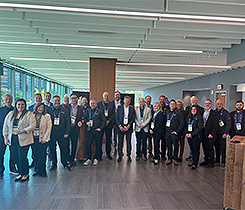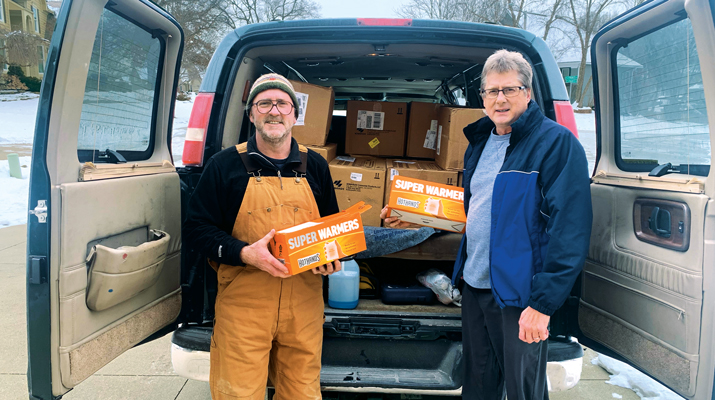Distributors: Still Vital
Over the past few years, propane industry distributors have been more and more concerned about their role as the link between equipment manufacturers and propane retailers. These distributors, who have been among the staunchest supporters of the industry, say price-cutting competitors offering lower prices, but virtually no customer service, are squeezing them out. They’re frustrated over losing business to competitors who sell exclusively on bargain-basement pricing.
“The ‘big-box’ companies primarily effect us in the appliance market,” says Bob Barry, president of Bergquist Inc. “They sell at much lower prices, which is really hurting the retailers. It has showed us all that low prices is what the end consumer is most concerned with.”
 |
Generally, “big-box” retailers sell products to customers at the same price a distributor would sell to a propane retailer. While “big-box” retailers have an edge on pricing for items such as grills, heaters and logs, Russ Ridings of Gas Equipment Co., chairman of the National Propane Gas Association’s Distributors Section, says price is only one factor that these Home Depot-type stores can offer.
“The ‘big-box” stores sell lower-end models without all the bells and whistles,” says Ridings. “Besides that, the quality is inferior and there is nothing in terms of service, training or safety. When something goes wrong, there’s no one there to turn to, unlike a distributor who will come right to you and fix the problem, leaving you with very little down time.”
Ridings cites grills made with thinner aluminum or that are hollowed out as examples of inferior products. Likewise, their shelves offer water heaters that don’t have enough power to run all household water needs at once or that waste gas because they don’t have regulators on them.
Pricing also becomes a problem when propane marketers get bought out by larger companies.
“The consolidation of our customer base creates pricing competition,” says Barry. “In the past, an independent marketer may have only known one or two distributors. When a larger company buys them out, they have access to every distributor in the industry, so prices get driven down.”
Pricing isn’t the only problem for the distributors.
Some say many of today’s propane marketers don’t recognize or appreciate the time, effort and financial investment that their companies put into the industry beyond product sales. They feel things like product safety, education and training go unrecognized when it comes time to purchase, not to mention the security of having someone you know and trust supplying your goods.
“We try to sell service and quality,” says Barry. “There is always someone here who can answer questions or service equipment. Plus, we try to represent quality manufacturers – companies and products you know and trust. Those are advantages we have over the ‘big-box’ stores.”
Howard Schneider, vice president of business development for Tarantin Tank and Equipment Co., also knows the value of a good distributor.
“Distributors are more than just warehouses for LP companies,” says Schneider. “Companies rely on the distributor for customer service, product training and technical assistance.”
To be successful, distributors must provide knowledgeable customer service and assistance in product selection, warranty claims and tracking of shipments. They also need to offer training on the products they sell to ensure the company has the knowledge of the product from sales to technical, he says, as well as industry training on codes and laws.
“Distributors must be flexible with training programs, though, because training may need to take place at a customer location, the distributor’s facility or a third-party location,” says Schneider.
Technical assistance is vital for the companies because they need answers in a timely manner – their businesses depend on it. Instead of contacting the manufacturer, the companies depend on distributors for technical assistance on installation, trouble shooting and maintenance. It’s one reason Schneider feels the relationship between distributors and companies has become increasingly important.
“Distributors assist companies to select the correct product for the particular job, not to sell products the company doesn’t need. The relationship between the equipment distributor and the gas marketer needs to be a true partnership to succeed,” he notes.
The changing marketplace has also impacted merchandise inventory. Traditionally, companies stocked products and promoted whatever they had. The trend has shifted in recent years, however. Companies now are ordering equipment when a customer requests it.
“Inventory is an integral part of being a successful distributor. The most important facet of inventory is to have the product companies want when they need it,” says Schneider.
Still, despite these issues, distributors feel they have the edge over “big-box” retailers.
“To me, nothing can replace technical knowledge of the product lines and an understanding of industry rules and regulations,” says Barry. “Distributors have broad experiences in the industry. We attend the shows and the meetings, we know our products and we know how rules are developed and enforced in every state.”
Ray Murray, chairman of Ray Murray Inc., agrees.
“Distributors offer complete customer care from start to finish. We educate, train, repair, service and troubleshoot for the life of the product. That’s something you’ll only get from a good distributor,” he says.
Ridings says he will continue trying to rally distributors, stressing the importance of continual education and involvement in the industry. He will also continue spreading the word about why distributors remain vital to the industry.
“The distributors who are members of the NPGA and state associations do so for the good of the industry. They spend many hours – just like the marketers – making sure that our industry is represented fairly, and they help avoid needless regulations,” says Ridings.
“Distributors are a medium that conveys technical knowledge from the manufacturers with application expertise from experience. The Distributor Section of the NPGA plans to continue to help make the association and industry stronger. We invite all distributors to get active.”
















